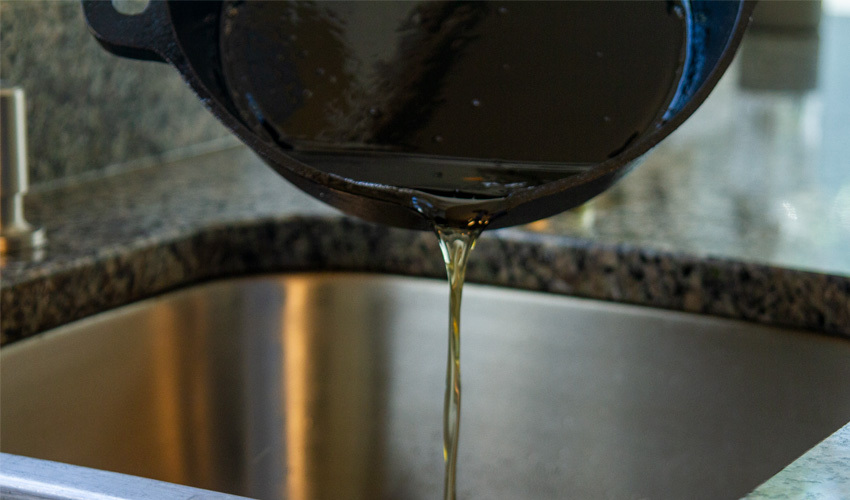Call This Wednesday to Get $25 OFF
Clean Solutions, Dirty Jobs – Done Right. Reliable. Responsive. Remarkable.
Call This Wednesday to Get $25 OFF
Clean Solutions, Dirty Jobs – Done Right. Reliable. Responsive. Remarkable.
While kitchen grease comes in handy for cooking delicious food, it can be a problem when it comes to disposal. Most people make the mistake of dumping kitchen grease in the sink and end up with clogged pipes. Furthermore, when grease ends up in the septic tank, it floats on the top of the wastewater and interferes with decomposition inside the tank. Your septic tank is designed to break down waste and tissue and not kitchen grease. That’s why you should avoid pouring kitchen grease or fat of any kind into your sink.

Why You Shouldn’t Put Kitchen Grease Down the Drain
Before we talk about the right way to dispose of kitchen grease, let's talk about what happens when you dump kitchen grease down the drain.
When you pour kitchen grease into the sink, it will eventually solidify and stick to the inside of your pipes. Even if the grease is in liquid form at room temperature, it will harden and clog up your pipes, resulting in backed up sinks. You should also avoid dumping kitchen grease in the garbage disposal as it will leave you with a stinky garbage disposal and can attract pests.
The septic system is an onsite waste treatment facility, and it is incredibly reliable. However, the system is only as effective…
Imagine flushing your toilet and then suddenly realizing that your backyard has turned into a swampy mess. This unpleasant experience is…
Soil testing is a critical step in various construction and environmental projects. It provides essential information about the ground conditions, which…
Grease traps are remarkable tools that help keep your establishment clean and free from bad odors. Septic Connection has a…
If you have just moved into a new home or property that relies on a septic system for waste and wastewater…
Kitchen grease should not be disposed of in the compost pile. While small amounts of kitchen grease in your compost won’t cause harm, a large amount of grease will cause bad odors and could make your compost unhealthy.
How to Properly Dispose of Kitchen Grease
One way to dispose of kitchen grease is to put it in a disposable container and seal it shut. You can then dispose it with other household garbage. Ensure the container is sealed properly and tightly. If the grease is in liquid form, let it cool and harden so that it is much easier to work with. You can also use plastic bags but ensure they are sealed properly.
It’s also a good idea to do some research to see if there are waste management facilities that recycle kitchen grease.
If kitchen grease goes down the drain by accident, pour ½ cup baking soda and ½ cup white vinegar down the drain to dissolve the grease. Alternatively, you can use an enzyme-based drain cleaner to neutralize the grease. If the problem persists, use a plunger to dislodge the clog or call a "plumber near me" to fix the problem.
If kitchen grease does make its way to your septic tank, it can interfere with the way wastewater is broken down. That’s why you need to clean your septic tank regularly to keep it functioning optimally. At Septic Connection, we provide septic pumping and septic tank cleaning to homeowners and businesses. We also provide septic tank repairs and replacement in case you want to replace your existing septic system.
The average household septic tank should be cleaned every 1 to 3 years and should be pumped every 3 to 5 years, depending on usage.
Call Septic Connection to book an appointment with our septic contractors.
When septic problems start, many homeowners look for quick and inexpensive solutions. Online videos, store-bought additives, and advice from well-meaning neighbors can make do-it-yourself septic fixes seem appealing. Unfortunately, septic…
Read moreA septic system is one of the most important—and most overlooked—components of a home. It manages wastewater quietly in the background, so many homeowners assume everything is fine until a…
Read more